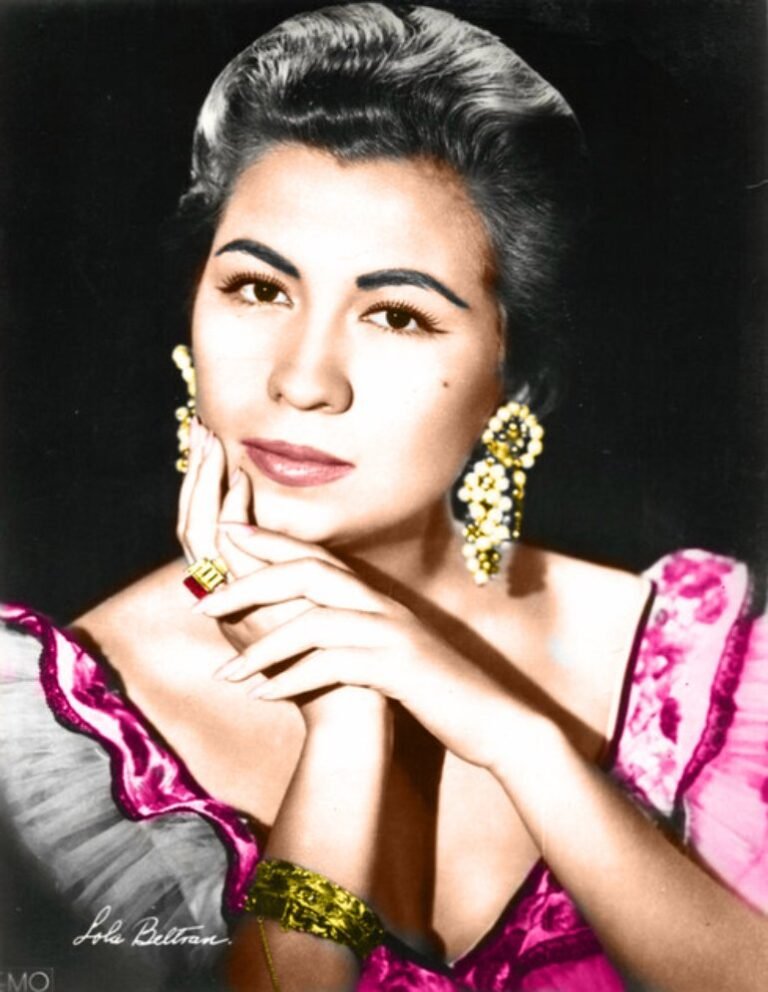Lola Beltrán, known as “La Reina del Ranchero,” is a name that has become synonymous with the soul of Mexican music. For decades, Lola Beltrán enchanted audiences with her powerful voice and emotional depth, earning a place as one of the most beloved figures in Latin music history. As one of the pioneers of ranchera music, her influence extends far beyond her time, and her songs continue to inspire listeners today. This article delves into the extraordinary life and legacy of Lola Beltrán, highlighting her journey from humble beginnings to international stardom and the lasting imprint she made on the world of Mexican music.
The Early Years of Lola Beltrán: From Sinaloa to the Spotlight
Born Dolores Beltrán Ruiz on July 7, 1932, in Rosario, Sinaloa, Mexico, Lola Beltrán grew up in a modest family, surrounded by the rich cultural and musical traditions of her region. Raised in a home where music was a cherished part of daily life, Lola Beltrán was drawn to the sounds of traditional Mexican folk music from an early age. Her mother was a talented singer, and it was through her that Lola Beltrán first experienced the joys of music. It wasn’t long before she started to sing herself, quickly gaining recognition for her powerful voice.
Despite facing financial hardships, Lola Beltrán was determined to pursue a career in music. In the early years, she competed in local talent shows, where her raw talent was noticed by important figures in the Mexican music industry. Her perseverance eventually paid off, and Lola Beltrán made her professional debut on the radio in the 1950s, marking the beginning of a stellar career that would span decades.
Lola Beltrán’s Breakthrough: The Rise of a Star
Lola Beltrán’s big break came when she began performing with prominent mariachi bands, notably Mariachi Vargas de Tecalitlán. This collaboration allowed her to bring the authentic sounds of Mexico to a wider audience and cemented her status as a leading figure in ranchera and mariachi music. In the 1950s, Lola Beltrán began appearing on popular radio shows, including La Hora del Té, which significantly boosted her popularity.
Her powerful voice and emotive delivery made her an instant favorite, not just in Mexico, but throughout Latin America. As a young woman in a male-dominated industry, Lola Beltrán broke barriers, proving that female artists could command the stage just as fiercely as their male counterparts. Her rise to fame was not only a testament to her talent but also to her ability to connect with audiences on a deep, emotional level.
Lola Beltrán and the Ranchera Genre: A Match Made in Heaven
At the core of Lola Beltrán’s career was her undeniable connection to the ranchera genre. Rancheras are deeply rooted in Mexican culture, often telling stories of love, loss, and life in the rural countryside. The genre requires a singer to convey a broad range of emotions, and Lola Beltrán had the vocal power and emotional intelligence to master it.
Her performances of classic rancheras like “La Cigarra,” “La Barca de Guaymas,” and “El Son de la Negra” elevated these songs to iconic status. What set Lola Beltrán apart from other artists was her ability to infuse every note with emotion, whether it was the melancholy of a love song or the triumph of a patriotic anthem. Her interpretations of these beloved Mexican classics became definitive, and she is still considered one of the greatest exponents of ranchera music.
In addition to ranchera, Lola Beltrán was known for her mastery of boleros, another popular genre in Latin music. This versatility allowed her to reach a broader audience and showcase her incredible vocal range, solidifying her status as one of Mexico’s most important musical figures.
The Signature Songs of Lola Beltrán: Timeless Classics
Over the course of her illustrious career, Lola Beltrán recorded hundreds of songs, many of which became anthems of Mexican music. A few of these songs have stood the test of time and continue to be associated with her legendary status in Latin music.
One of her most iconic songs, “La Cigarra,” written by Mario Molina Montes, is a poignant ballad that compares the fleeting nature of life to the short-lived life of a cicada. Lola Beltrán’s rendition of this song is often regarded as the definitive version, with her powerful voice lending an added depth to its already somber lyrics. The song is a testament to her ability to bring raw emotion to her performances, and it remains a fan favorite to this day.
Another major hit in Lola Beltrán’s career was “La Barca de Guaymas,” a romantic ballad about lost love and longing. Her version of the song became one of the most beloved renditions in the mariachi genre, showcasing her ability to express profound emotions with sincerity and grace.
“Que Bonita es Mi Tierra,” a song celebrating the beauty of Mexico, is yet another classic that became closely associated with Lola Beltrán. With its patriotic lyrics and uplifting melody, the song allowed her to showcase her love for her country while further solidifying her place in Mexican music history.
Lola Beltrán: A Cultural Icon Beyond Music
While Lola Beltrán is most famous for her contributions to music, her influence extended beyond the stage. She became a symbol of Mexican identity, embodying the strength, resilience, and beauty of her country. Her elaborate costumes, larger-than-life personality, and unrelenting devotion to Mexican traditions made her a cultural icon, both in Mexico and around the world.
Her influence as a female artist in a male-dominated industry also paved the way for other women to find success in ranchera and mariachi music. Lola Beltrán’s success proved that a woman could not only perform with the same skill and emotional power as her male counterparts but could also become an unstoppable force in the music industry.
Lola Beltrán‘s presence on stage was electric—her performances were not just concerts, they were events. She became a national treasure, one of the most respected and celebrated figures in Mexican entertainment. Her style, confidence, and ability to captivate audiences helped elevate the entire mariachi genre and brought it to international prominence.
The Enduring Legacy of Lola Beltrán: A Voice for Generations
Though Lola Beltrán retired in the 1980s and passed away in 1996, her legacy remains as strong as ever. Her songs continue to be featured on radio stations and are regularly performed by modern-day ranchera artists. In many ways, Lola Beltrán paved the way for future generations of musicians who follow in her footsteps, using her music as an inspiration for their own careers.
Her influence also extends to other genres of Latin music. Contemporary Latin artists often cite Lola Beltrán as a major influence on their work, particularly those in the regional Mexican music scene. Her mastery of vocal technique, her emotional expressiveness, and her deep connection to Mexican culture continue to inspire new generations of musicians who seek to emulate her style and emotional depth.
Lola Beltrán: A Symbol of Mexican Musical Tradition
In addition to her musical contributions, Lola Beltrán’s lasting legacy is a testament to the strength and beauty of Mexican culture. Through her voice, she gave life to the stories and experiences of the Mexican people. Her songs conveyed the joys, sorrows, and triumphs of a nation, and her performances were a reflection of the heart and soul of Mexico itself.
Whether through her heartfelt renditions of ranchera classics or her bold, dramatic stage presence, Lola Beltrán will always be remembered as one of the most important figures in Mexican music. Her influence is felt not only in Mexico but across the world, where her songs continue to echo in the hearts of fans everywhere.
Conclusion: The Timeless Voice of Lola Beltrán
Lola Beltrán‘s voice remains one of the most recognizable and powerful in the history of Latin music. As the undisputed queen of ranchera and mariachi music, she transcended the borders of Mexico, bringing the beauty and emotion of Mexican culture to the world stage. Her career was built on a foundation of passion, dedication, and love for her country, and her songs continue to touch the hearts of listeners today.
Her legacy as a musical trailblazer, cultural icon, and voice of Mexico is secure, and her contributions to Latin music will never be forgotten. Lola Beltrán‘s music lives on, continuing to inspire generations of fans and artists alike, making her a true legend in the world of Mexican and Latin American music.


